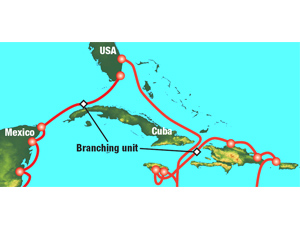No one has misplaced Guantanamo Bay, but the half-century-old U.S. embargo on trade with Cuba has made the Communist-ruled island nation “terra incognita” on the world’s telecommunications map. The White House’s new policy of opening the door to travel and telecommunications links with Cuba could soon sketch in the country.

“I think there’s a tremendous potential opportunity there,” says Tom Soja, Boston-based vice president of Ocean Specialists Inc., an engineer and contractor for subsea cables. Fiber-optic cables snake all around and through the Caribbean Sea and the Gulf of Mexico. But none link to Cuba because traffic on the cables transverses U.S. territory, and carrying Cuban transmissions would violate the U.S. embargo.
Two of the cables, ARCOS and CFX Express Route, were laid with a branching unit off Cuba to allow connection when the embargo is lifted, says Soja. The new U.S. policy, announced on April 13, authorizes U.S. telecommunications network providers to enter into agreements to establish fiber-optic cable and telecommunication satellite facilities linking the U.S. and Cuba. Soja is excited about that. “I’m not sure how many cables would have to be laid at this time,” Soja says, but he thinks several cables will be built.
The ARCOS and CFX cables are owned by Columbus Networks, North Miami Beach, Fla. Company officials were traveling and unavailable for comment on plans for connecting to Cuba.



Post a comment to this article
Report Abusive Comment